Text
WTHisDiversity?
Pomona College has been working on a vision for diversity in the past couple of years, and they recently released a draft of their vision here. The draft is titled "Lighting the Path to 2025: A Vision for Diversity". The final version of this document will affect literally every Pomona student for the next 10 years. So the contents of this document better be constructive in molding a more safe, opportunistic, and progressive environment at Pomona.
Pomona has given us a chance to respond to the draft and make suggestions. This is your chance to actually contribute to the betterment of the campus climate! As of a couple of days ago, only 16 students had submitted feedback. We want more student input to go into this document.
Yesterday (10/29/14), AAMP, OEC, and the WU hosted an event to shed light on what this document says and will do in the next 10 years. First, there were some presenters who broke down the document into its main points so that people understood what the document said. Then, we formed small groups to discuss possible improvements that could be made to this document. We wrapped up by having time (and lots of computers) to submit feedback. This event was one step towards AAMPlifying student voices in a campus dominated by the administration.
Please submit feedback! The link is here. You need to log in to my.pomona.edu first. You can change Pomona.
3 notes
·
View notes
Text
Celebrating AAMP's 25th Birthday
Yesterday we celebrated AAMP’s 25th birthday in the Walker Lounge. It was a really fun time for everyone to just get together and enjoy each other’s company. There was everything—great food, goodie bags, board games, and even cake! We had two old mentors come and speak about their experiences (or whatever they wanted to talk about, really): Chris and Mia. Chris talked about the importance of the AARC and Mia, my very own mentor, talked about what AAMP has done for her. Afterward, we had cake! Well, not quite. Goeun actually dropped the cake. I definitely saw the cake’s life flash before its eyes as it fell. Lol jk. No, but really, everything was fine! We just scraped off the icing from the top of the cake. The cake was still delicious. I don’t really like icing anyway. Happy 25th Birthday AAMP!
2 notes
·
View notes
Text
Culture is Not a Costume!
Recently AAMP co-sponsored an event called Culture is Not a Costume, a workshop that is part of a series of workshops addressing the issue of cultural appropriation. The workshop displayed images and footage of examples of cultural appropriation of many—not just Asian—cultures. The images mostly focused on Halloween costumes and how many of them inaccurately and offensively portray certain cultures. People were able to comment on the images with post-it notes, a great feature of the workshop because, believe me, those pictures were worth a thousand words. After being able to walk through the ethnic studies department and see all the pictures, read all of the stories and quotes addressing cultural appropriation, and watch the music videos of artists who appropriated culture, we congregated in a single room and opened a discussion on the subject. Topics of discussion ranged anywhere from why what we saw was upsetting to where we draw the line between cultural appropriation and acceptable practice. Cultural appropriation is always a difficult topic to tackle because of that very question, which is why we’re having more workshops on it, so stay tuned!
2 notes
·
View notes
Text
AAMP Retreat!
So recently we went on our AAMPazing (haha, get it? It's punny) retreat to Pomona's Halona cabin in the Idyllwild mountains! If you didn't go, I'm here to give you a recap of what went down:
Food, Friends, and Self-Actualization. That's it. End of recap.
Lol, jk. Yes, those three things happened, but how exactly? Well, here's how:
Retreat was a great time for mentees to meet mentors and other mentees. Especially mentees in their own AAMP group. I actually walked by two of my mentees while they were meeting each other and saying, "Hey, did you know we're in the same AAMP group?" I obviously couldn't help jumping in, so I quipped, "You would've known that if you came to more AAMP events!" Yup. Come to AAMP events, everybody.
The food was Frary packout, basically the same thing we always have at retreat: salad, breadsticks, spaghetti with marinara sauce, browies, bagels, and yogurt. Pretty basic, so that wasn't the highlight of the food. Our head mentor Catherine went all-out at Costco with the snacks. We had cookies, candy, juice--it was enough to fill you up without ever touching the Frary packout.
And lastly, what makes AAMP retreat different from other retreats: the workshops geared toward APIA issues. The first workshop was a Call to Action Timeline, with significant but usually little-known APIA events and incidents. It was a great time to discover our shared history and see what brought a lot of us here today. The second workshop was on the Model Minority Myth and how even a "good" stereotype can be harmful, not only to the APIA community, but to the entire community of color. The workshops were informative and fostered an even deeper sense of community.
All in all, the retreat was great, and if you couldn't make it, there's still Spring Retreat!
0 notes
Text
Is that your mom?: Conversations about mixed families
From now on, we'll be trying to record thoughts from AAMP/AARC-related events on Tumblr. Our hope is that our events live beyond the night at which they're hosted. The Mixed Families conversation was a while ago, but it's worth revisiting lessons learned that day. Here are some thoughts from students who attended the event.
Catherine Dugan: The mixed heritage event put on by the AARC was a great event! We split up into smaller groups, and I really liked mine because it was a mix of grades and schools. We addressed questions about how being mixed influenced how we talked to our parents about race, or how we experience being in public with our families.
Christopher Song: “Is that your mom? Discussion about mixed race families” was an event put on by the AARC’s Mixed Heritage Committee in collaboration with the 5Club MERGE (multi-ethnic, racial group exchange). The event provided a space for students to share their experiences growing up in mixed race families and to reflect on instances of microaggressions and empowerment. The event’s purpose was to build community and let these students know that their experiences are important and should be part of an ongoing conversation. We closed the event by providing everyone with a copy of Dr. Root’s Bill of Rights for People of Mixed Heritage. The topic of our next event will be interracial relationships.
Gillian Chen: As an individual that identifies as a TCK (Third Culture Kid), I have always felt like a patchwork of cultural identities. I have never been comfortable with choosing one single heritage and dismissing the other traditions, cultures, and values that have influenced me. At the Merge event, “Is That Your Mom?” I was able to explore what it meant personally to identify as a TCK, as well as listen to other’s experiences growing up as a people of mixed race. While some shared experiences that I could relate to, such as having people confine you to a single culture/ race, there were others who expressed frustrations that I had never encountered before. The title of the event itself was derived from a misunderstand that many biracial children experience, where they have been disassociated from one or both of their parents simply because of the way they look. The biggest takeaway for me, apart from being to learn more about being a mixed kid, was the idea that I shouldn’t have to choose. I should not be constrained by the social norm of belonging to one single culture or race. I can be both. I can choose both. But I will still be me.
1 note
·
View note
Video
So hilarious but so true
youtube
Jenny Yang in “If Asians Said the Stuff White People Say”
"I just LOVE dating white guys because they’re so large and overbearing"
"Omg 2 forks?! That would look totally cute in my hair!"
44K notes
·
View notes
Link
While Asians are seen as the “Model” minority, it’s their “Model” status that so often works against them. People will rightly claim that Asians make more money and ignorantly claim that Asians are totes the smartest people ever, they overlook the fact that Asians are human beings. Flawed,...
284 notes
·
View notes
Link
1. Speaking about the Holocaust in any context other than educational is downright immoral, 9/11 needs a trigger announcement and a disclaimer if you discuss it in public but the murder of over 30 million Africans is OLD NEWS that I need to just drop and get over.
2. In History class, no one...
392 notes
·
View notes
Quote
Broaching the topic of “White Privilege” is not synonymous with “All white people are evil and, I hate them all.” Chill out.
Want to watch a white person rush away from a dinner party? Just bust out phrases like “institutionalized racism,” “white supremacy,” and the oldie but goodie “residual effects of slavery that are still with us today,” and watch a room of white people clear itself out, or, at least, have them stammer out the names of all the black people they are friends with, and then offer another unsolicited list off all the good they’ve done for people of color.
When I talk about systemic racism and historical racial inequalities as it ties into white privilege and modern-day racism, I think I must sound like this to white people: “Hey Whitey! I am going to kill you.” I know this is a lot to ask of white people, but could you please STOP FLIPPING OUT when the topic of white privilege comes up? I’m talking about being defensive, blabbing about how there is no such thing as race (just one human race, which is actually made up of different races), and how you are so gifted as a white person that you “don’t see race.” Ooh, that last one, ouch.
That’s why we need to have this conversation — because the inability to “see” racism and privilege is exactly what white privilege is. Talking about race is not a trap. It’s not a game of “Gotcha with your Klan Hood Down.” Talking about white privilege is not about asking white people to leave their race. Nor is it about declaring genocide on the white race. (Besides, looks like we’re already going to outnumber you by 2050, so you might as well sit back, relax and enjoy being Wong-splained.)
Talking about white privilege is not even about trying to make you feel like shit for being white. Surprising, I know. But the conversation on white privilege concerns you and yet is not about YOU. And when you make it about how you feel personally attacked, we really don’t progress further into talking about how we’re going to fix racism. Really.
If you are a white person who gets nervous when white privilege gets brought up, imagine having to navigating racism in every day life as a person of color who must live with it. Imagine systemically being locked out of better education or healthcare, job opportunities or the mainstream American narrative.
There are moments as an Asian American when I’ve been regarded as an “honorary white.” (There are also many other moments when I am reminded that I will always be a perpetual foreigner despite the fact that my family has been in the United States for three generations.) But rather than take whatever privilege I can and run with it, I’m interested in talking with people who benefit from white privilege -– how and if they can recognize it and use their positions of privilege to dismantle the systems that oppress other people.
Believe it or not, I’d love for the world to be more equitable for EVERYONE. And when I ask you to recognize your white privilege, it’s not because I’m trying to place blame. It’s about asking white people to consider the moments where they are able to “pass” in certain situations. Where they are afforded privileges that they never earned. It’s about finding ways to cede privilege, space, and comfort to allow others to live in a more equitable world.
So white people, the conversation about race can’t happen without you. We can’t get things better if we aren’t all talking. If racism were an easy problem to fix, we would have fixed it already. Ending racism starts with recognizing privilege, systemic control over society at large, and when you are dismissing issues of racism then you have the privilege of being oblivious to.
Don’t get me wrong there are people of color who proclaim to drink the tears of white people. There are anti-racism activists who will never organize with the most “down” of white people. I don’t want to drink your white tears, but I’d be lying if I said that I don’t enjoy watching you squirm a little.
Come on, you got to give me that.
I Can’t Believe I Now Have to Convince White People I Like Them by Kristina Wong (via fascinasians)
We're not attacking you. Really!
4K notes
·
View notes
Quote
Being proud of having so-called “yellow fever” is a form of racism. You are not only trivializing a disease that is still prevalent (yes it really is, affecting roughly 300,000 and killing 20,000 people each year) but also saying you won’t date other races is…well racist, isn’t it? You don’t know what tomorrow may bring; you haven’t met all men from every race. How can you happily dismiss a person based on their ethnicity before knowing their personality? You would be happy with an abusive partner as long as he/she was a particular race? Whether or not this is what you believe, by making that statement, this is the thought that is implied. It is a form of hypersexualization.
Sometimes I feel like people who post things like “I want a Korean boyfriend/girlfriend” have this assumption that all Korean people are like their bias. K-pop does not equal Korea.
I Love Korean Boys: The Problem of Fetishization (via danggeun)
Fetishization is still racism, you guys!
3K notes
·
View notes
Photo
George Takei, shedding light on us asians.
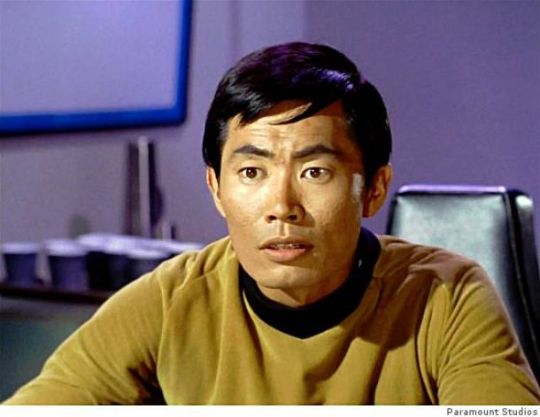
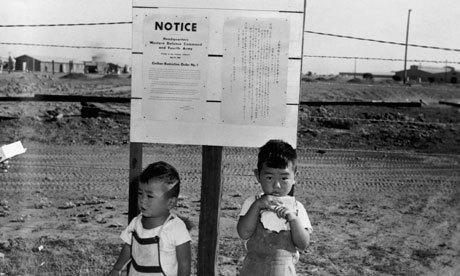
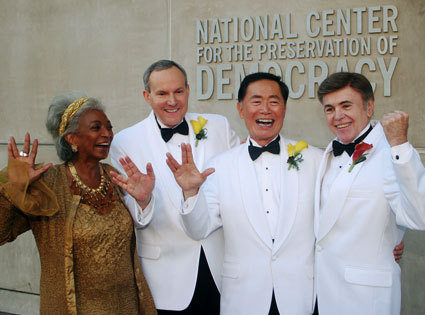
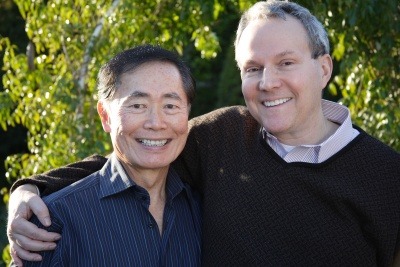
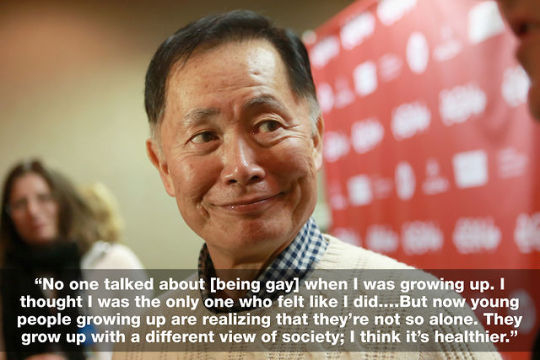
Spotlight Series: 5 Times George Takei Inspired Us
1. When he took on his legendary role as Sulu and gave the Asian community a hero. “So many people have told me that for the first time they had someone they could relate to and be proud of when they turned on Star Trek… because they saw an Asian character who was not a stereotype, who was in many ways a hero, who was part of the leadership team…and that made them feel proud.” (YouTube)
2. When he opened up about growing up on a Japanese internment camp. “Life in prison became routine. We lined up three times a day to eat lousy food, I went with my father to a mass shower, and then I started school. The irony that I still remember is that they taught us the Pledge of Allegiance, and I could see the barbed wire fence and the sentry tower right outside my schoolhouse window as I recited, “…with liberty and justice for all.” (The Daily Beast)
3. When he marched with Dr. Martin Luther King, Jr. as a teenage activist. “I was in a civil rights musical at that time, Fly Blackbird, and I met Dr. Martin Luther King, Jr., and shook his hand. I was involved in activism from my teenage days, then the peace movement during the Vietnam War, then the redress movement for Japanese-Americans.” (The Daily Beast)
4. When he broke his silence on LGBT rights and came out. “I decided to come out to the press after then-Governor Schwarzenegger vetoed legislation granting marriage equality in California. I was outraged that he would cave to political pressures, but also inspired by the young people I saw demonstrating against his actions.” (The Huffington Post)
5. When he reminded us that inclusiveness is not only better, but healthy too.
For all the awesome that you are, George Takei we <3 you!
5K notes
·
View notes
Photo
Coalition building is real. And necessary. So let's get on that business!
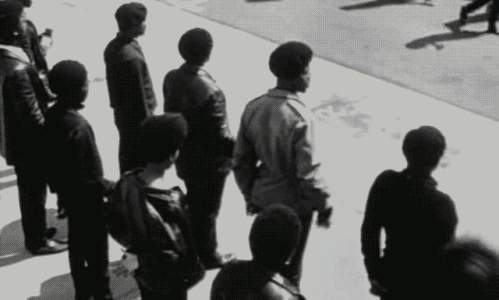
This has gotta be the coolest thing I’ve ever seen on the internet
Black Panther Party and the Asian American Political Alliance
81K notes
·
View notes
Note
hey, I need your advice on a topic. I work as a waitress in a japanese-vietnamese restaurant while I am half korean half german. On many occasions I had white people say "konichiwa" or things alike to me, one man even bowed down as a greeting. One jokingly wondered why all the waiters could speak without an "asian" accent. I know they don't mean it in a bad way but I am offended and feel like they make fun of my korean heritage. How should I react without overreacting?
I mean I don’t want to put your job at jeopardy but just have a very neutral or “really? fuck off” face or give them the most condescending and sarcastic smile. No need to attend to those assholes. You don’t have to say anything you don’t want to but you don’t need to oblige to their racist remarks.
-Leah
11 notes
·
View notes
Note
I met an interesting girl the other day. She's black and adopted by a Korean couple. She was raised in Korea with the language and the culture and traditions--basically she was raised like a Korean child. Lucky for her, she was in a mainly accepting village and public Korean school as well, so she was very accepted into the Korean culture. She has identity problems because everything she knows is Korean and when she came to USA, they told her she can't identify as Korean. I'm curious. Thoughts?
Wait, who is “they”? Cause she can be trans-ethnic, which is a term for children who were adopted by a family of a different race/ethnicity. I’m not an expert in that area but she’s not appropriating any culture if that’s how she was raised and identify as. It’s a problem when other people “want to be a different culture” because they think it’s more interesting or something.
-Leah
25 notes
·
View notes